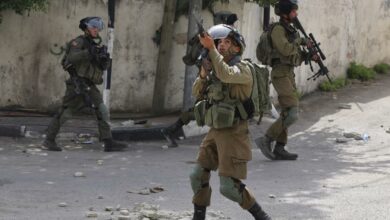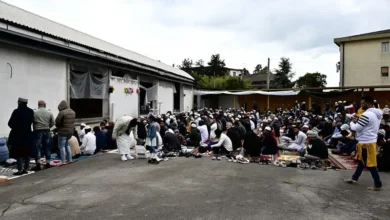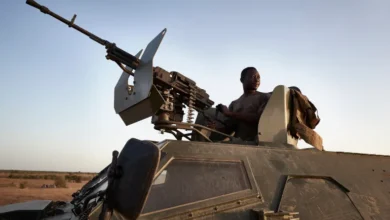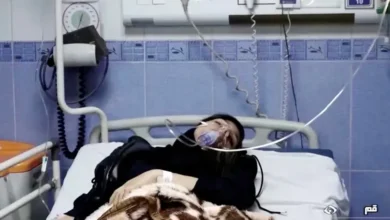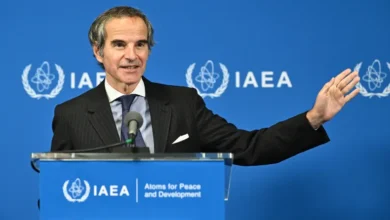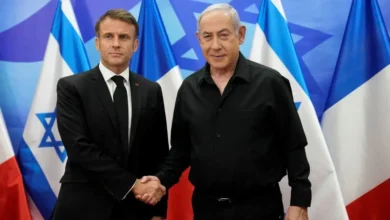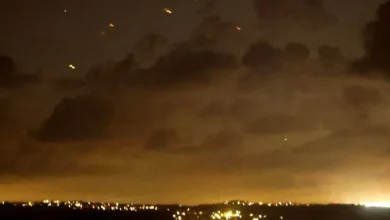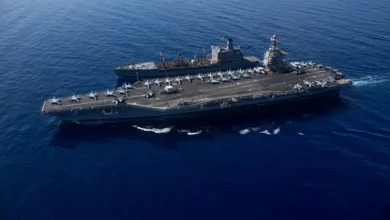Hamas leader assassination, Israel-Hezbollah escalations raise Middle East tensions
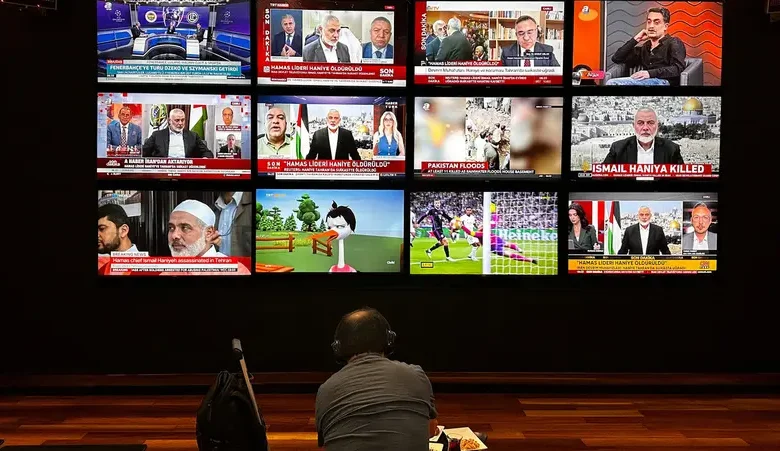
The assassination of Hamas leader Ismail Haniyeh in Tehran on Wednesday, a day after the Israeli military “eliminated” Hezbollah military commander Fuad Shukr in Lebanon, has raised regional tensions and threats in the broader Middle East amid the 10-month Israel-Gaza war, experts have said.
Security experts warn of the potential spillover to the wider Middle East as tensions between Israel and both Lebanese armed group Hezbollah and Palestinian militant group Hamas escalate, with some warning that Israel is playing “a dangerous game of chicken” as it carries out retaliatory strikes across its regional borders.

Haniyeh was assassinated around 2 a.m. local time on Wednesday, Iranian media reported, adding that he was staying at “a special residence for war veterans in north Tehran.” The incident came just hours after Israel’s military announced late on Tuesday it had killed Fuad Shukr, whom it named as Hezbollah’s most senior commander and blamed for the weekend attack in the Israeli-occupied Golan Heights that left a dozen youths aged between 10 and 16 dead.
Hezbollah has denied any involvement in the weekend attack, according to statements carried by Reuters. Meanwhile, the group confirmed on Wednesday that Shukr was in the building in the southern suburbs of Beirut targeted by the Israeli strike, but it did not confirm his fate. Israeli Defense Minister Yoav Gallant said Shukr “has the blood of many Israelis on his hands…we have shown that the blood of our people has a price and that there is no place out of reach for our forces to this end.”
While no one has yet claimed responsibility for Haniyeh’s assassination – news of which broke shortly before 7 a.m. Wednesday – suspicion has fallen on Israel, which had vowed to kill the Hamas leader and other members of the Palestinian group over the group’s Oct. 7 attack on Israel that killed 1,200 people and saw around 250 others taken hostage.
Analysts have also speculated that Israel was behind the assassination.

“Israel being able to reach top leaders like Hezbollah’s Shukr and Hamas’s Haniyeh in-side Beirut and Tehran deals Iran and its allies a deeply humiliating double blow,” Lina Khatib, associate fellow at the Middle East and North Africa Program, at the Chatham House think tank said.
“Though tensions are rising”, the danger of wider regional escalation is still relatively low as she believes “Iran and its allies remain constrained in what they can do in retalia-tion.”
Iran’s Islamic Revolutionary Guards (IRGC) said Haniyeh was assassinated in Tehran where he had attended the inauguration of the country’s new president Masoud Pezesh-kian. In a statement, Hamas mourned the death of Haniyeh, who it said was killed in “a treacherous Zionist raid on his residence in Tehran.”
‘A very dangerous game of chicken’
On Israel-Hezbollah tensions, senior political scientist at RAND Corporation, Raphael Cohen, told Al Arabiya English that, even before Hezbollah’s alleged strike on a soccer field in Majdal Shams, the administration of Prime Minister Benjamin Netanyahu was under “growing political pressure to restore deterrence in the north both from the vari-ous far right political parties inside the government, but also from the opposition.”
“After all, roughly 80,000 Israelis have been displaced from their home in northern Israel and Netanyahu was being criticized for ‘losing the north,’” Cohen told Al Arabiya English. “Unsurprisingly, after the Majdal Shams tragedy, a range of Israeli leaders – Netanyahu, Gallant, Halevi, but also opposition members like Benny Gantz, Naftali Bennet, and even Yair Lapid – were calling for a strong response.”
There a several scenarios when looking at Israel’s response in the strike on Shukr, according to Cohen.
“On the one hand, it’s an escalation. Shukr has been described as the ‘right-hand man’ to Nasrallah,” Cohen said. “The strike happened in Beirut, which Israel has largely avoided striking. In this sense, it was designed to send a clear message that Hezbollah crossed a ‘red line’ – as some Israeli officials have said.”
“At the same time, if this strike is sum of Israeli retaliation (and that remains to be seen), it is less escalatory than some alternative options (e.g. a large-scale air campaign or even a ground operation),” he added.
According to the political scientist, if this turns out to be true, it fits within the pattern seen on the northern front over the past 10 months. Both Israel and Hezbollah know an-other full-fledge war would be “immensely costly,” he added, but neither side wants to back down.
“The net result is they are stuck in tit-for-tat violence and a very dangerous game of chicken,” Cohen said.
“As for what Israel’s ultimate endgame is in Lebanon, it’s that the northern border quiets down, that displaced Israelis can return home, and the Hezbollah pulls back north of the Litani river in accordance with UNSC resolution 1701.”
‘A region on edge’

Regional analyst Avi Melamed said that Israel’s “strategic strike” against Hezbollah’s Shukr “likely took Hezbollah by surprise, given the brazenness of the Israeli strike targeting the Hezbollah stronghold in southern Beirut and the high-level access Israel would have needed to have in order to hunt Shukr.”
He added: “Likely, Hezbollah had previously thought Israel’s response to its Saturday launch against Majdal Shams would be something focused on weapons depots or infra-structure. It will therefore need to carefully consider its next level of response to Israel’s targeted assassination of Shukr, in Beirut.”
He added that Hezbollah supporters in southern Beirut are calling for a strike against major Israeli cities like Tel Aviv, “a move that will almost certainly trigger a full-scale war with Israel.”
According to Melamed, “Both Hezbollah and Iran are facing the agonizing dilemma of how to respond to Israel’s strike.”
Israel ready for ‘any scenario’
Before the Tuesday strike, the Israeli military said that it wanted to avoid any wider war with Hezbollah but that its forces were ready for “any scenario.”
“Hezbollah’s ongoing aggression and brutal attacks are dragging the people of Lebanon and the entire Middle East into a wider escalation,” military spokesman Rear Admiral Daniel Hagari said in a statement. “While we prefer to resolve hostilities without a wider war, the [Israeli army] is fully prepared for any scenario,” he added.
A statement shared from the Israel Ministry of Foreign Affairs, however, said the “massacre” of 12 children on Saturday in Majdal Shams showed that Hezbollah’s goal is to “kill Israeli citizens wherever they are, adding that “Israel will exercise its right and duty to act in self-defence.”
Israel said the rocket that killed the children was an Iranian-made Falaq and was fired by its ally Hezbollah.
Hezbollah has denied responsibility for firing the rocket, though it claimed multiple launches toward Israel on Saturday.
Israeli forces and Hezbollah have been engaged in near-daily clashes along the border since the start of the Israel-Hamas war on October 7.
The violence has so far killed 22 soldiers and 24 civilians on the Israeli side, including in the Golan, according to army figures.
At least 527 people have been killed on the Lebanese side, according to an AFP tally.
Most have been fighters, but the toll includes at least 104 civilians.
Internationally, political leaders, including from the US and the United Nations, have mobilized to try to stop the war in Gaza from spreading to Lebanon.
